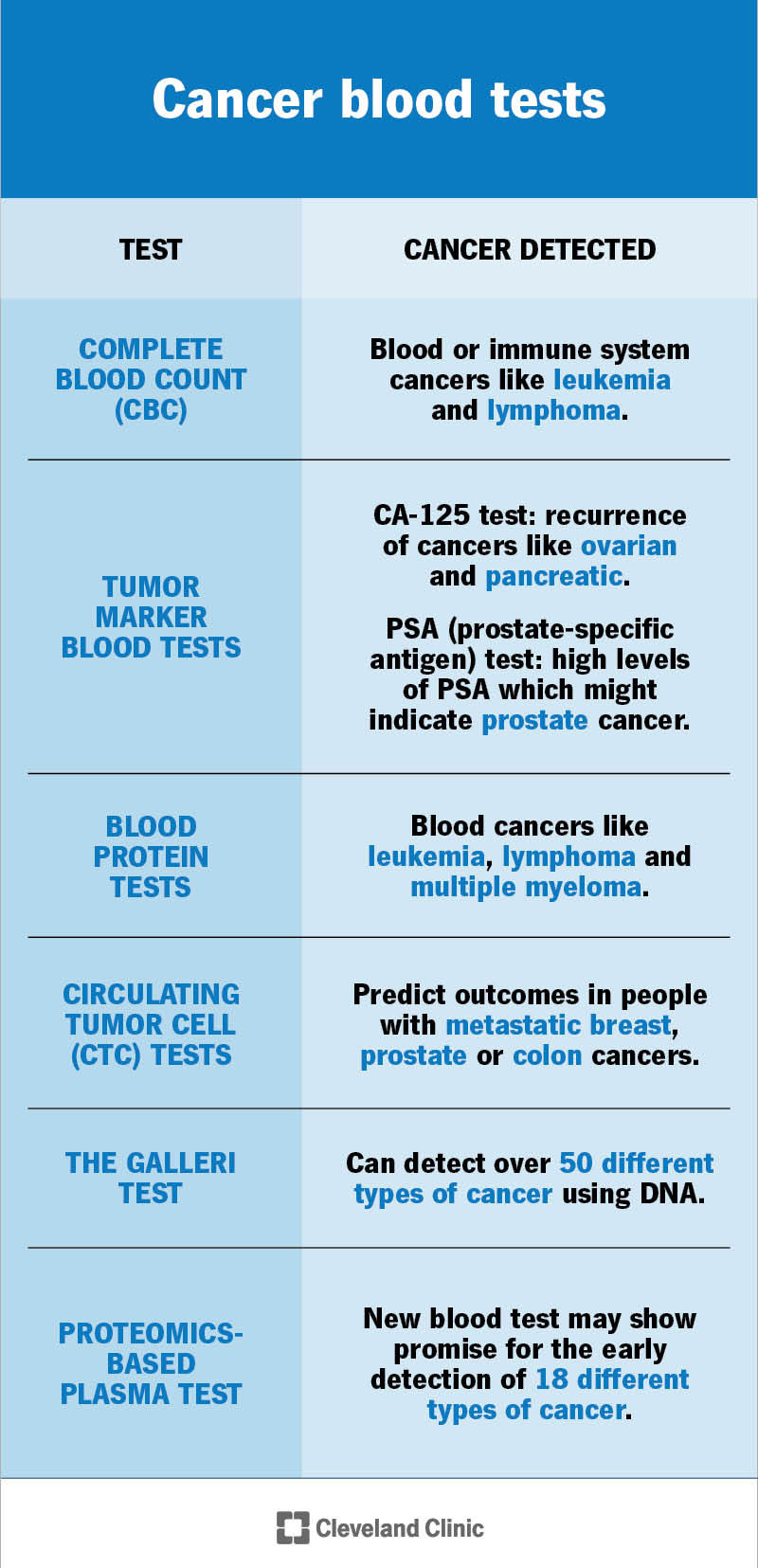Cancer blood tests are one of the many tools that healthcare providers use to diagnose and stage malignancies (cancerous growths). These tests can provide valuable information about your overall health, organ function and potential disease. But you’ll need additional tests to get a full understanding of your diagnosis.
Advertisement
Cleveland Clinic is a non-profit academic medical center. Advertising on our site helps support our mission. We do not endorse non-Cleveland Clinic products or services. Policy

Image content: This image is available to view online.
View image online (https://my.clevelandclinic.org/-/scassets/Images/org/health/articles/blood-tests-for-cancer)
Blood tests are one of the many ways that healthcare providers diagnose, stage and manage cancer. But in most cases, you’ll need more than blood tests for an official diagnosis.
Advertisement
Cleveland Clinic is a non-profit academic medical center. Advertising on our site helps support our mission. We do not endorse non-Cleveland Clinic products or services. Policy
Blood work alone can’t detect most types of cancer. But it can help detect some blood cancers like:
Healthcare providers categorize cancer blood tests into four main types:
Advertisement
Blood tests usually aren’t enough for a cancer diagnosis. You’ll almost certainly need additional tests, which may include:
Most cancers don’t show up in routine blood work. But there are specialized blood tests that can detect early-stage cancers in some people:
Results of these tests must be interpreted cautiously, and implications for further testing and treatment must be discussed with a qualified healthcare provider.
Many early-stage cancers are infamously difficult to diagnose. But routine cancer screenings can help detect certain types of cancer before you develop symptoms. Ask your healthcare provider about age-appropriate screenings to help keep your health in check.
In combination with other tests, blood work can give your provider important information about:
Your healthcare provider will give you specific instructions on how to prepare for your blood test. These guidelines may differ depending on the type of test you need.
In some cases, you might have to fast for eight to 12 hours prior to the test. That means you shouldn’t eat or drink anything besides water. You also may need to avoid certain medications beforehand.
Collecting a sample of your blood should only take a few minutes. Your healthcare provider will:
Advertisement
After a cancer blood test, you should keep the bandage on for a few hours. You may also need to avoid exercise for a few hours afterward, if advised by your healthcare provider. (Elevating your heart rate can cause increased bleeding.)
Blood tests are safe and involve very little risk. You might have a small bruise where the needle went into your skin. Rarely, the vein may swell. In these cases, applying a warm compress (like a warm washcloth or heating pad) can help.
You’ll probably get your results in a day or two. But depending on the type of test, it could take several days.
Your healthcare provider will let you know when to expect your results and discuss them with you at an appointment.
If your blood test indicates that you might have cancer, your healthcare provider will refer you to an oncologist (a cancer specialist). The oncologist might run additional tests to confirm the diagnosis and recommend an appropriate treatment plan.
Advertisement
Cancer treatment almost always requires a multidisciplinary team of providers. Your oncologist will work with several different specialists to get you the treatment you need.
No, healthcare providers don’t use lipid panels to check for cancer. A lipid panel is a test that measures cholesterol and triglycerides in your blood. It helps providers check your risk for cardiovascular diseases like stroke and heart attack.
Yes, it’s possible to have cancer even when you get normal blood test results. This is because blood work alone can’t detect most types of cancer. Certain blood cancers — like leukemia, lymphoma and multiple myeloma — are exceptions to this rule.
Waiting to find out whether you have cancer can feel like you’re frozen in time. It’s hard to go about your day-to-day activities when you don’t know what tomorrow will bring. Your healthcare provider will run several tests to confirm a diagnosis — and checking your blood for cancer is just one method. They’ll tell you what each test does and what your results mean.
Advertisement

Sign up for our Health Essentials emails for expert guidance on nutrition, fitness, sleep, skin care and more.
Learn more about the Health Library and our editorial process.
Cleveland Clinic’s health articles are based on evidence-backed information and review by medical professionals to ensure accuracy, reliability and up-to-date clinical standards.
Cleveland Clinic’s health articles are based on evidence-backed information and review by medical professionals to ensure accuracy, reliability and up-to-date clinical standards.
When you’re diagnosed with cancer, you want expert and compassionate care right away. At Cleveland Clinic we personalize your treatment to match your needs.
